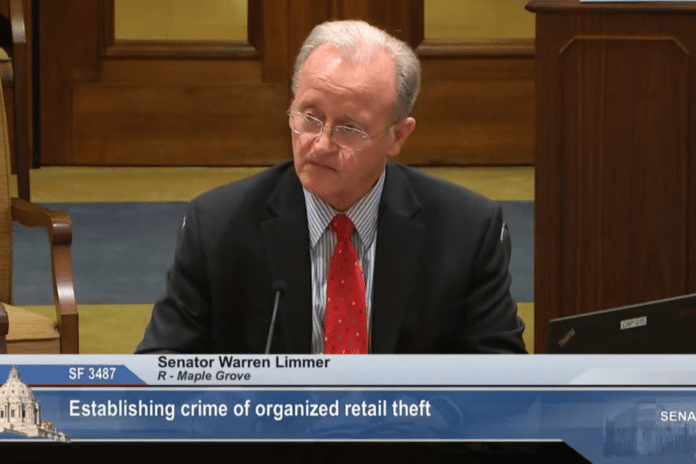
The Minnesota Senate Judiciary and Public Safety Committee listened to testimony Wednesday on a bill that seeks to crack down on the rise in organized theft.
SF 3487 is a bipartisan bill that proposes to establish a “crime of organized retail theft,” according to a bill summary.
The bill summary defines organized retail theft this way: “This crime occurs when a person steals or fraudulently obtains retail merchandise from a retailer and: resells or intends to resell it; advertises or displays it for sale; returns it to a retailer for anything of value; or the act occurs within five years of a previous conviction under this section. In addition, receiving stolen retail merchandise with the intent to resell it and possessing shoplifting-related devices with the intent to use them to shoplift are also violations.”
A companion bill in the Minnesota House, HF 3914, is authored by Democratic Rep. Zack Stephenson of Coon Rapids.
Sen. Warren Limmer, author of the Senate bill, described organized retail theft as “professional shoplifting.”
“The facts are that three-fourths of retailers saw an increase of organized retail crime in 2020,” said Limmer.
He said Minnesota law fails to distinguish organized retail crime from other types of theft. This bill seeks to change that while adding “enhanced accountability.”
“It’s a tool for prosecutors and law enforcement. We hope it will have an impact on the organized theft that is going on at retailers of all sizes right here in Minnesota,” he explained.
Bruce Nustad of the Minnesota Retailers Association referenced the story of a retail entrepreneur out of Little Canada who “poured his life” into his store but had to close because he was “victimized five different times” in five months.
Most recently, he lost $13,000 in footwear. The thieves likely didn’t steal such a huge quantity of shoes for their own personal use, Nustad pointed out.
“His dream is done,” he said. “His investment and his time is lost at this point.”
The committee also heard from Taylor Wiechert, co-president of the Minnesota Organized Retail Crime Association. She stressed the need for differentiating between ordinary forms of theft and “these organized, intentional, sophisticated, and sometimes international criminal thefts.”
“It is critical to understand the crippling impact of these losses to the small businesses that have fewer resources to combat these losses,” she noted.
The testifiers said organized retail crime has been a problem for many years but is on the rise. In one case, a group stole $26,000 worth of merchandise on Black Friday from Best Buy stores in Maplewood, Burnsville, and Blaine and a Dick’s Sporting Goods store in Richfield.
One of the criminals charged described this behavior as a “lifestyle” and even claimed to be operating a “certified booster” business called “Run Outs By Ralai.” He allegedly resold some of the products online and hosted a “hiring event” because he needed a few “helping hands” for the Christmas season.
The Minnesota Grocers Association also sent the Senate committee a letter of support for SF 3487.
“According to national statistics as much as $70 billion worth of products were stolen from retailers in 2020,” the letter says. “Retail crime results in lost economic activity, fewer jobs, and increased risks to consumers. Retail theft also costs federal and state governments billions in personal and business tax revenues.”
“Organized retail theft also poses a threat to the safety of store employees,” the letter adds. “A recent survey revealed an alarming increase in threats and violence against store associates. Of those businesses surveyed, the majority said that an associate had been verbally threatened or physically assaulted by someone committing theft. This is a troubling trend.”
















